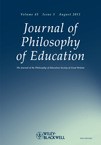-
Views
-
Cite
Cite
Kathy Hytten, Being White, Being Good: White Complicity, White Moral Responsibility, and Social Justice Pedagogy. By Barbara Applebaum, Journal of Philosophy of Education, Volume 45, Issue 3, August 2011, Pages 573–576, https://doi.org/10.1111/j.1467-9752.2011.00813.x
Close - Share Icon Share
Extract
Lanham, MD: Lexington Books, 2010. Pp. v+221,Hb. $75.
The central argument that Barbara Applebaum makes in her new book, Being White, Being Good: White Complicity, White Moral Responsibility, and Social Justice Pedagogy is that traditional notions of moral responsibility are not only insufficient in our efforts to disrupt white supremacy, they may actually contribute to the reproduction of racism. In contrast, she argues for a model of responsibility that is premised on complicity. These are provocative claims that she defends thoughtfully throughout the book. The crux of Applebaum’s argument revolves around the compelling distinction she makes between white privilege pedagogy and white complicity pedagogy. She argues that a pedagogy that is premised primarily on understanding how white privilege operates encourages individualistic thinking and a superficial understanding of how to work toward social change. Moreover, it leads to the problematic assumption that once understood, whites can somehow give up their privileges, develop a ‘positive’ white identity, and consequently act confidently toward enacting social justice. Alternatively, a pedagogy of white complicity begins with the recognition that whites are always caught up in privileging systems that are not of their own individual making. We never escape this complicity; rather, we must learn how to challenge racist systems while recognising the limits of our understanding and the always-complicated nature of our moral actions. The driving question Applebaum explores is what it means for whites to be both complicit in reproducing inequitable power structures and simultaneously responsible for working against them. She responds by offering a powerful vision of white responsibility premised on uncertainty, vulnerability, humility and critique.





